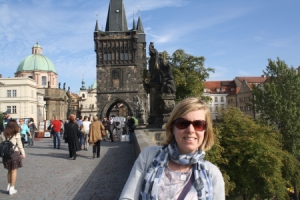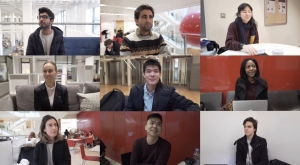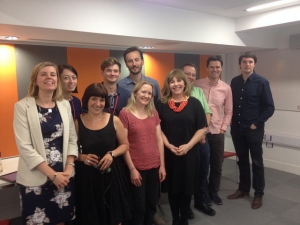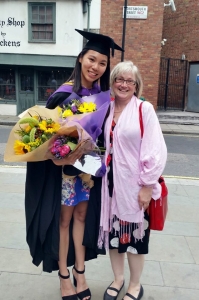Research in the age of Wikipedia
Copyright and Digital literacy advisor Jane Secker reports live from Prague on her recent work on information and digital literacy.
I’m really excited to be pre senting at the European Conference on Information Literacy which this year is being held in Prague from 10th -14th October. This is the fourth conference and I’ve been lucky enough to attend every year since the conference started in 2013 in Istanbul. I went to Dubrovnik in 2014, Tallinn in 2015 and this year I am in Prague. The focus of the conference is information literacy, and many papers address issues related to digital literacy as well. It’s a European conference but in fact people come from all over the world, so it’s a fantastic place to get a global perspective on the work I do at LSE to support staff and students develop their digital literacy. The conference also has a strong link with the work I do to provide support and education in copyright matters. This year there are nearly 300 delegates from over 50 countries with just 19 from the UK. The conference theme is about information literacy in the inclusive society and we’ve had keynotes from Tara Brabazon and Jan Van Dijk.
senting at the European Conference on Information Literacy which this year is being held in Prague from 10th -14th October. This is the fourth conference and I’ve been lucky enough to attend every year since the conference started in 2013 in Istanbul. I went to Dubrovnik in 2014, Tallinn in 2015 and this year I am in Prague. The focus of the conference is information literacy, and many papers address issues related to digital literacy as well. It’s a European conference but in fact people come from all over the world, so it’s a fantastic place to get a global perspective on the work I do at LSE to support staff and students develop their digital literacy. The conference also has a strong link with the work I do to provide support and education in copyright matters. This year there are nearly 300 delegates from over 50 countries with just 19 from the UK. The conference theme is about information literacy in the inclusive society and we’ve had keynotes from Tara Brabazon and Jan Van Dijk.
I am presenting twice at the conference, firstly in a panel session that was held on Monday, based on outreach and advocacy work I do as Chair of the CILIP Information Literacy Group (ILG). My co-presenters were Sharon Wagg from the Tinder Foundation, who are a charity who work to promote digital inclusion, and Stephane Goldstein, who as well as being a freelance consultant, is the Advocacy and Outreach Officer for the ILG. In our panel we discussed some recent collaborations between librarians in academic sector with those in public libraries, to share their experiences of helping to develop digital literacies and promote digital inclusion. The TeachMeet events ILG and Tinder Foundation organised earlier in the year were a great way that academic and public librarians could share ideas and experience. I was delighted that two colleagues from LSE Library, Andra Fry and Sonia Gomes, attended one of these events in February to share our experiences from the Student Ambassadors for Digital Literacy (SADL) programme we were running for three years, to support LSE undergraduates. The panel discussion encouraged participants to share any digital inclusion initiatives they were involved in around the world. We also discussed what made these collaborations successful and why there might be problems and challenges working in this space. Sharon highlighted the Tinder Foundation’s work with libraries through their digital inclusion fund and it was inspiring to hear about work to support the most vulnerable in society, such as the elderly, job seekers and refugees develop basic and more advanced digital skills.
ECIL is also the spiritual home of copyright literacy, as this was where I first heard about the work of Tania Todorova and her colleagues to survey librarians on a country basis about their knowledge of copyright and requirements for education in this field. This was back in 2014 in Dubrovnik and last year Chris Morrison from the University of Kent and I presented the UK survey results in Tallinn. This year I’m returning to present our latest research, exploring the experiences of UK librarians of copyright, using a research method used in education and information literacy called phenomenography. It’s still early days – we carried out 3 focus groups in higher education and have been juggling work and some pretty intensive data analysis. As neither of us had used phenomenography before we are grateful to the help and advice we received from Emma Coonan and Lauren Smith, as well as several very useful articles they pointed us to. I’m sharing our slides from the ECIL presentation which I delivered on Tuesday morning. It has also been great to catch up with Tania, Serap, Joumana and several of the people who undertook the copyright literacy survey in their own country. Part of what motivated Chris and I to do this research was to understand the fear and anxiety that copyright can create, to look at why it’s a topic many in higher education shy away from learning more about, and use this data to better inform how we develop copyright education. I was struck once again by how important it is to get an international perspective on the work we do, and to see in many cases there are so many things we can learn from others experiences and so much that unites us in our work.
The research and collaboration with Chris has informed my thinking about the best way to provide support for others with copyright queries at LSE. For example, I now use a Copyright Card Game in my workshops, which are a fun and engaging way to learn about copyright. However, being seen as ‘the copyright expert’ can be quite a lonely place, and for me it is important that everyone learns a bit about copyright. This is partly what has motivated me to set up a Copyright Community of Practice at LSE (admittedly I did borrow this idea from Chris who set one up at Kent over the summer). The next session is going to be on the 4th November and it is open to any member of staff at LSE! Meanwhile I will enjoy a few more days in beautiful Prague and return to LSE full of more ideas and possibilities to enhance the support that we provide!
Are you interested in developing students digital and information literacies on your courses? Jane is co-running a workshop with TLC and the library on Thursday 20 October 14:00-15:30
Using good practice and examples from the LSE and elsewhere, this session will focus on how to integrate digital and information literacies into the courses and programmes that you teach.
Book a place via the training and develop system:
https://apps.lse.ac.uk/training-system/userBooking/course/7591852
See our website for more information and guides on digital and information literacy




 Two weeks ago I attended the
Two weeks ago I attended the 





